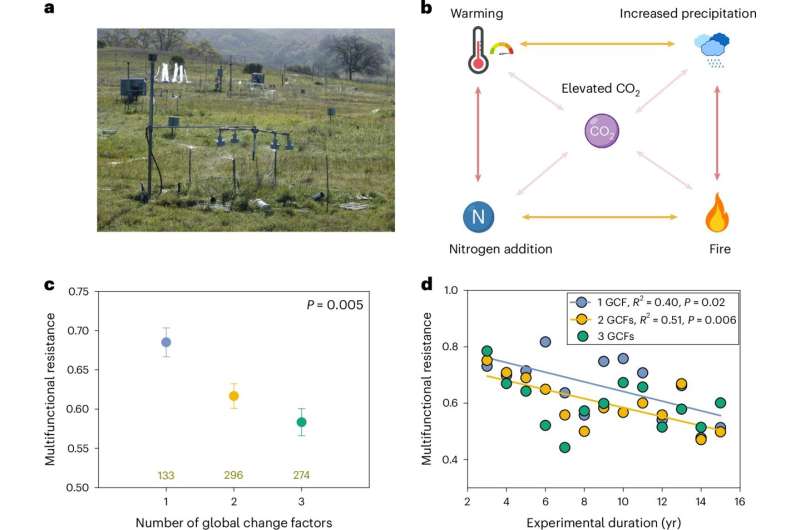
Open forests in New South Wales, Australia. Photo by Manuel Delgado Baquerizo. Credit: Manuel Delgado Baquerizo
An international study led by the Institute of Natural Resources and Agrobiology of Seville (IRNAS-CSIC), of the Spanish National Research Council (CISC), has shown that as the number of global changes increases, the environment of the world has many reactions to the results. of world change.
The results, published in the journal Nature Geoscienceshow that the resistance of our environment to global change decreases significantly as the amount of environmental pressure increases, especially when this pressure continues over time.
This is the conclusion reached by the Biodiversity and Ecosystem Functioning Laboratory (BioFunLab) at IRNAS-CSIC after analyzing 1,023 global adaptation experiments in collaboration with 10 international institutions, including the German Institute for Integrative Biodiversity Research (iDiv) Halle-Jena-Leipzig, University of Alicante, Northeast China Forestry University, Massachusetts Institute of Technology (MIT) in the US, and the University of New South Wales in Australia.
“The world’s natural resources are subject to many climate changes and environmental degradation conditions, including global warming, droughts, atmospheric pollution, fire or grazing among others. We know that these global changes affect the ability of our environment to provide such services as carbon or soil fertility that are important in the fight against climate change and food production.
“What we did not know is whether the increase in the number of global changes affects the ability of the environment to resist this global change,” explains Manuel Delgado Baquerizo, leader of BioFunLab and senior author of paper.
“Our research shows that as the number of global changes we drive increases, these ecosystems become more sensitive and reduce their natural capacity to resist the impacts of environmental degradation.”

The Jasper Ridge Global Change experiment conducted over 15 years shows that increasing levels of change around the world offset the resistance of an important ecosystem service (ie, plant productivity) over time. Credit: Nature Geoscience (2024). DOI: 10.1038/s41561-024-01518-x
The study also shows that the ongoing effects of global change on the global environment contribute to reducing the natural capacity of the environment to withstand the increase in the number of global drivers of change. This conclusion was reached by analyzing 15 years of data from a US-based experiment that includes the effects of many factors of global change on important ecosystem services such as primary production.
“Our results show that long-term exposure to many drivers of global change, such as increases in CO2 and warming, gradually reducing the ability of the environment to maintain essential services such as primary production. This is important to understand the limitations we will face in important resources such as water and nitrogen,” explains Emilio Guirado, co-author of the paper at the University of Alicante.
“Our study shows that the increase in global drivers of change will significantly reduce the resilience of the environment to global change. However, this effect is most evident in the ability of the environment to we offer environmental services beyond the diversity of our environment,” he explains. Guiyao Zhou, lead author of the paper and member of BioFunLab.
“These findings show that the sustainability of our environment depends on reducing the number of global drivers of change related to human activity,” concluded Zhou.
Additional information:
Guiyao Zhou et al, The resistance of ecosystem services to global change is weakened by the increasing number of environmental pressures, Nature Geoscience (2024). DOI: 10.1038/s41561-024-01518-x. www.nature.com/articles/s41561-024-01518-x
Awarded by the National Research Council of Spain
Excerpt: Ecosystems study finds environmental stress is high, lowering resistance to global change (2024, August 23) retrieved on August 23, 2024 from https://phys.org/news/2024-08- ecosystems-higher-environmental-stress-resistance.html
This document is subject to copyright. Except for any legitimate activity for the purpose of private study or research, no part may be reproduced without written permission. Content is provided for informational purposes only.
#Ecosystems #study #finds #higher #pressure #environment #resistance #global #change